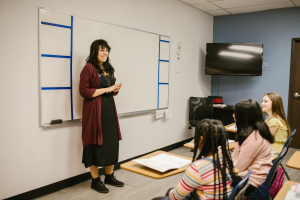Top 16 Most Asked School Psychologist Interview Questions with Answers
Working as a school psychologist is a meaningful and fulfilling career for many professionals. Individuals in this field may benefit from being analytical, ... read more...empathetic, and committed in addition to academic training. If you want to pursue this career, familiarizing yourself with common interview questions can help you prepare. Here are some of the most asked school psychologist interview questions with answers.
-
Trust is the foundation of any relationship, and it is one of the most important qualities that a teacher should instill in their students. Gaining the trust of students is a critical component of being a helpful and effective school psychologist. Hiring managers may ask you this question to learn more about your specific trust-building practices and to determine whether your strategies will work well in the culture and environment of the school.
Consider responding by emphasizing how much you value the children's and your colleagues' trust and sharing any techniques that have proven beneficial to previous students. This question allows you to demonstrate your commitment to developing and maintaining trusting relationships.
Answer as an example: "Earning students' trust is extremely valuable as a school psychologist because it facilitates honest communication. It's helpful if the students see me as a member of their community, someone who can offer support and listen without passing judgment. Active listening has helped me build trust with students in the past because it allows them to share their thoughts and feelings without worrying about what I'll say or how I'll react. I've also found that making myself available during school activities such as school functions, dances, and assemblies helps them understand that I'm available if they need me."

Image by Van Tay Media via unsplash.com 
Image by Christina Morillo via pexels.com -
The hiring manager is interested in learning how you would handle a specific situation that you might encounter if you accept the position. If you have professional experience with these situations, talk about how you handled them in the past and what you learned. When answering this question, consider using the STAR technique, where STAR is an acronym for situation, task, action, and results. This means that even if you haven't dealt with a situation like this before, talk about how you might handle it, the task you can complete, the action you take, and the results you might get.
Answer as an example: "Although teachers typically prepare for dealing with disruptive students' behavior, there may be times when a student's actions change dramatically or become unmanageable. As a school psychologist, I can collaborate with the teacher to gain a more comprehensive understanding of the situation and the student's behavior. Then I'll think about what's motivating the child's actions and work with them to address the underlying issue. This may entail collaborating with the teacher or parents to provide support and guidance to the student. Finally, I hope to be able to resolve the situation."

Image by Andrea Piacquadio via pexels.com 
Image by RODNAE Productions via pexels.com -
Clinical psychology, communication skills, collaboration, behavior analysis, mental health, instruction, and intervention are the most common and important skills required by employers. These skills and requirements are just as likely to be mentioned by employers as they are on the resumes of people who have previously worked as school psychologists, implying that having these keywords on a resume is important for success as a school psychologist. Furthermore, a pre-kindergarten teacher is listed as a desirable experience in employer school psychologist job descriptions, despite the fact that a pre-kindergarten teacher appears 6.12 times less on resumes, indicating that it's worth considering including this skill if you have the experience.
A school psychologist may benefit from a variety of skills, including strong analytical abilities, strong interpersonal skills, and excellent listening abilities. Consider reviewing the job description to see if any specific skills are listed so you can highlight how you meet their expectations. List relevant skills and provide insight into how you might apply them to the role when answering this question.
Answer as an example: "A good school psychologist can have a variety of skills that can help them connect with students and perform their professional duties effectively. Collaboration with my team, supervisors, teachers, and students is one of my strongest skills. This allows for a more comprehensive approach that results in long-term positive outcomes for the children. I've learned throughout my career that I can't do my job alone, and that when I collaborate with others to develop plans or implement strategies, we can have the greatest impact on the students."

Image by Mikhail Nilov via pexels.com 
Image by Mikhail Nilov via pexels.com -
When you have a large number of work tasks to complete each day, you may need to create an efficient system to manage them. Prioritizing is a method of determining what you should do first based on its importance. Understanding the best ways to prioritize your tasks can help you save time at work. Prioritizing entails determining the order in which tasks should be completed based on their importance. This strategy may assist you in better organizing your time. This teaches you how to prioritize tasks, meet deadlines, and have more time to complete larger tasks. Prioritization abilities can assist you in completing more work in less time.
School psychologists are frequently required to account for a large number of students and address their unique situations, which may include responding to a variety of demands. This can include meeting specific requirements or meeting deadlines. Describe how your organizational skills and tools enable you to create a prioritized list that assists you in managing and scheduling all of your tasks.
Answer as an example: "As a school psychologist, I understand that unexpected situations may arise, and I am prepared to deal with last-minute or emergency situations. Due to these circumstances, I may need to reschedule and re-prioritize upcoming tasks. I use a calendar to plan my time and keep track of upcoming deadlines. I set aside a certain number of hours each week to account for potential unexpected situations that allow me to reschedule certain events. I can also communicate my availability to my team and supervisor by using a calendar."

Image by Karolina Grabowska via pexels.com 
Image by Karolina Grabowska via pexels.com -
You may have seen educational psychologists assisting students with learning disabilities and assisting students with their emotional and social well-being. However, you may be unfamiliar with their assistance and support for school staff. They can especially help with issues involving misbehaving students and difficult parents (factors that have a negative impact on teacher well-being).
An educational psychologist assists teachers by providing them with space to sit and reflect on specific children as well as different methods of assisting them to problem-solve around systemic factors in their setting. This question allows you to demonstrate your understanding of the role and responsibilities of a school psychologist. It may also be an opportunity to discuss your previous experience working in schools or other educational institutions, as well as how you assisted teachers. You can respond by demonstrating to the hiring manager that you understand how you can collaborate with teachers to assess student progress and assist teachers as they support their classes.
Answer as an example: "When I work with teachers, my goal is to support them in assisting their students to make social, emotional, and academic progress. I can advise teachers and discuss options with them to help improve the behavior of their students, or I can mention if I notice that a specific child appears to be struggling. Teachers may be able to observe their classes and collect data on students' progress, and I can assist them in analyzing their findings and developing strategic plans based on their findings."

Image by RODNAE Productions via pexels.com 
Image by Karolina Grabowska via pexels.com -
What makes you want to work here? It's a common interview question, but it can be difficult to answer, especially if you try to wing it. Not preparing a solid response to this question is risky because it could mean the difference between whether or not a potential employer extends you a job offer.vAnd many hiring managers are currently asking this question of job candidates. With so many professionals quitting their jobs as part of "The Great Resignation," employers want to ensure that new hires are serious about the opportunity and want to be a long-term part of the organization.
At any point during the job interview, in fact. This question, however, is most likely to be asked early in the meeting, when the interviewer may use it to set the tone for the conversation. It may also come up near the end of the interview, as the hiring manager seeks to confirm your enthusiasm and interest in the opportunity now that you've learned more about it. The interviewer is curious as to what piqued your interest in the job posting. Use this opportunity to sell yourself and explain how your services will benefit the school.
Answer as an example: I enjoy assisting students. Coming from a poor and abusive family, I understand how our childhood experiences can shape us. As a result, I would be delighted to assist your students, the majority of whom come from low-income families.

Image by Thirdman via pexels.com 
Image by Sora Shimazaki via pexel.com -
Candidates use work experience and accomplishments to demonstrate that they have the qualifications that employers seek throughout the interview process. While hard skills (such as technical training and education) are important, employers also seek soft skills, or interpersonal skills that directly influence what kind of employee each candidate will be. When an employer inquires about your qualifications, they want to know how you are qualified for the position. The qualifications of the ideal candidate will closely match those listed in the job posting. Even if the hiring manager has read your resume, you must demonstrate that you possess the qualities they seek.
Read through the job posting to prepare an answer to this question. Then, make a list of all your qualities and skills that match the job requirements. Circle one or two characteristics that you believe make you stand out. This question can be answered in two parts. To begin, describe the attribute and how you have demonstrated it in the past (or how you currently demonstrate it in your workplace). Then, explain why that skill qualifies you to work for the position. Your response does not have to be long and involved, but it must demonstrate that you possess a specific quality and demonstrate why you are an ideal candidate.
Answer as an example: Given the ever-changing problems that students face, a school psychologist must be willing to learn. They must also be patient, ethical, have strong interpersonal skills, and respect confidentiality.

Image by Sora Shimazaki via pexels.com 
Image by cottonbro studio via pexels.com -
You may be asked to describe your previous work experience during a job interview. Even if your resume contains information about your previous job roles, knowing how to answer this question during an interview can help you highlight the skills you believe are most valuable in the prospective role. Any job comes with a set of responsibilities, so knowing your prior experience can help your interviewer determine how prepared you are for a role. Even if your experience is visible on your resume or application, your ability to summarize your work history and relate it to the position can demonstrate that you've considered your potential employer's expectations.
This interview question allows you to summarize your education and training that make you the most qualified candidate for the position. You can use this time to explain how the items on your resume prepare you for the responsibilities of this position and how they contribute to the company's goals. Consider writing down quick talking points before your interview to help organize your thoughts, and use the steps below to help prepare your answer.
Answer as an example: My career started as a general psychologist working in various hospitals. I then obtained skills and certifications to work in schools. I have worked in 10 schools in the last fifteen years of my career, where I have helped students deal with stress, poor performance, anxiety, and low self-esteem.

Image by airfocus via unsplash.com 
Image by airfocus via unsplash.com -
Life is not black and white, and there is no such thing as a perfect job. Of course, when everyone was young and fantasizing about their future and the job they'd like to have one day, they tend to forget the bad things. They only see good things when they are looking for a meaningful purpose or a way to make a lot of money to support themselves and their families. However, hiring managers are aware of this reality. They've been in their jobs long enough to know the ins and outs of the corporate workplace, and they want to hire people who see the job realistically, with all of its challenges.
And that pretty much sums up what they want to hear from you in the interview: that you recognize the challenges and are prepared to face them, rather than pretending that they don't exist or hoping that everything will be easy on the job. The interviewer would like to know if you did any preliminary research on the job. Do not be afraid to bring up a potential problem.
Answer as an example: The main issue here, which I have previously addressed, is that the majority of your students come from crime-ridden areas and may have unconsciously embraced violence. However, I believe I have the right behavioral change programs for such students.

Image by airfocus via unsplash.com 
Image by airfocus via unsplash.com -
Staying motivated to complete tasks can be extremely difficult, whether you work in an office or from home. After all, work is only one aspect of one's life. and concentrating on it for eight or more hours does not come naturally. So it's up to each individual to figure out what motivates them the most and then style their work accordingly. However, because motivation is influenced by many physiological and mental factors, there are numerous approaches to it. So, if you're having trouble staying motivated at work, here are twenty motivational tips.
This popular strength-based interview question throws many candidates because it is broad and easy to misinterpret, and it can throw you off if you haven't thought about it ahead of time. The best answers to interview questions about your motivation are honest, but they should also relate to the job you're applying for by implying that you'd be a good fit for it. A good response to any interview question is concise and uses telling detail. Whatever you say about your motivation, you need to back it up with examples from your studies, work experience, and/or extracurricular activities, and it should relate to the skills and aptitudes required for the job you’re going for.
Answer as an example: I am interested in psychology and helping people improve their lives. This job provides me with personal rewards and gratification, which keeps me going. I also enjoy the human interaction that this job requires. When I talk to students or teachers, I get excited, and it gives me a reason to come to work the next day.

Image by airfocus unsplash.com 
Image by krakenimages via unsplash.com -
Teachers are aware that the amount of time they have with their students is limited. Good teachers make the most of their instructional time while minimizing distractions. They are experts at dealing with adversity. They resolve issues quickly and efficiently, minimizing disruptions. A disruptive student is the most common source of distraction in the classroom. This manifests itself in a variety of ways, and a teacher must be adequately prepared to deal with each one. They must act quickly and appropriately while maintaining the student's dignity.
Teachers should always have a plan or specific strategies in place to deal with a disruptive student. It is critical to recognize that each situation will be unique. A strategy that works well for one student may irritate another. Individualize the situation and make your decisions based on what you feel will minimize the distraction with that particular student the fastest. The interviewer is interested in your reaction to this specific situation. The STAR technique is the best way to deal with this.
Answer as an example: I'll speak with the teacher to learn more about such a student. This will also assist me in determining why the student chose to misbehave. I will then begin a behavioral change program with the student to assist in resolving the issue at hand.

Image by Amy Hirschi via unsplash.com 
Image by Jason Goodman via unsplash.com -
Children's mental health is an important component of their overall health and well-being. Children's mental health includes their mental, emotional, and behavioral well-being. It has an impact on how children think, feels, and act. It also influences how children deal with stress, interact with others, and make healthy choices. Mental disorders in children are defined as significant changes in how children typically learn, behave, or handle their emotions, resulting in distress and difficulties getting through the day.
Attention-deficit/hyperactivity disorder (ADHD), anxiety, and behavior disorders are among the more common mental disorders that can be diagnosed in childhood. There are various methods for assessing children's mental health and mental disorders. The CDC uses surveys, such as the National Survey of Children's Health, to describe the presence of positive indicators of children's mental health and to learn about the number of children who have been diagnosed with mental disorders and whether they have received treatment. This question seeks to elicit your experience dealing with problems encountered by students. Keep in mind that there is no right or wrong answer. Your response should be based on your previous experience.Answer as an example: Anxiety, low self-esteem, and eating disorders are some of the major issues I've dealt with in my career as a school psychologist. When students compare themselves to their peers, many feel inadequate, which affects their performance. Some also want to be like the celebrities they see on Instagram and other social media platforms, bringing about this deficiency.

Image by Jason Goodman via unsplash.com 
Image by Mapbox via unsplash.com -
School psychologists assist children and adolescents in achieving academic, social, behavioral, and emotional success. They work with educators, parents, and other professionals to create safe, healthy, and supportive learning environments for all students, strengthening connections between home, school, and the community. School psychologists have received specialized training in linking mental health to learning and behavior. Improve academic achievement by collecting and interpreting data from students and teachers, consulting on student and teacher behavior, and conducting psychological assessments.
Promote positive behavior and mental health by providing individual or group counseling on coping skills, anger management, social skills, and conflict resolution, assessing social-emotional and behavioral needs, and collaborating with community-based providers. Providing culturally and linguistically responsive evaluations of students' unique and diverse learning needs and collaborating with school teams to improve student engagement and learning. Create safe, positive school environments by implementing school-wide positive behavioral supports (SWPBIS) and providing crisis prevention and intervention services.
Increase family-school partnerships by assisting families in understanding their children's learning and mental health needs, connecting families with community service providers, and providing parent workshops across the district. Improve school-wide assessment and accountability by working with school teams to monitor student, classroom, and school-wide academic and behavioral progress. The interviewer is interested in whether you understand the duties of a school psychologist. You may mention what you were assigned to do in previous jobs.
Answer as an example: A school psychologist is primarily responsible for identifying and resolving problems that may interfere with learning. In previous jobs, I was expected to assess students' needs, review processes, consult with parents and teachers, and observe students' learning.

Image by Mapbox via unsplash.com 
Image by Mapbox via unsplash.com -
Most people go into school psychology to work with children and families in school settings, to solve complex problems, and to support student learning and mental and behavioral health. Many school psychologists would agree, however, that the benefits of a career in school psychology extend beyond the reasons they became school psychologists in the first place.
School psychologists use psychological and educational foundations to understand school systems, effective teaching, and successful learning. They play an active role in identifying the psychological, behavioral, social, or emotional issues that are impeding students' academic success and developing a systemic solution that promotes academic success in a safe, healthy, and supportive environment. School psychologists are the primary problem solvers in terms of improving student outcomes in schools.The interviewer wants to know if you are excited about this role or if you are only interested in it for the money. Make sure your response is filled with passion and enthusiasm. You can also talk about your childhood experiences.
Answer as an example: I understand the difficulties that students face, especially in the age of social media and technological advancement. I chose to become a school psychologist in order to assist them in overcoming such obstacles. I can assist them in dealing with stress, anxiety, low self-esteem, and depression.

Image by CoWomen via unsplash.com 
Image by Michael DeMoya via unsplash.com -
Suicide can be a frightening subject. Often, simply seeing or hearing the word triggers personal and societal fears. The thought of a coworker, friend, or loved one discussing suicide or "wanting to die" can be even more overwhelming and frightening. There are two types of situations you may encounter with people who are suicidal: passive and imminent. Both should be taken seriously, though they will most likely be handled differently. In either case, don't be afraid to ask detailed and challenging questions. Inquiring about suicide does not increase their chances of attempting it. Instead, it reduces stigma, alleviates feelings of isolation, and increases support, lowering the likelihood of suicide death.
The interviewer is interested in how you would handle such a pressing and sensitive issue. While responding, make sure you persuade them that you have excellent interpersonal skills. You can also share your experience dealing with suicidal students.
Answer as an example: I recognize the weight of responsibility that comes with such an admission. I will handle the situation in accordance with the circumstances. However, I will make certain that the student understands that I am there for him or her and that their life means so much more to me. I will also adhere to the school's policy in this regard.

Image by Surface via unsplash.com 
Image by Surface via unsplash.com -
An employer wants to learn more about your skills and background during a job interview. One way they might do this is to inquire about your greatest achievements. When preparing for this type of question, think about your top professional accomplishments and choose the ones that best represent what you're capable of. Employers will ask, "What are you most proud of?" to learn a few key facts about you. For starters, this question clarifies your definition of success. They can tell how ambitious and goal-oriented you are based on your response. Second, they want to know what skills helped you achieve this goal.
Your response allows you to explain how your abilities contributed to your success. Finally, this question allows the employer to determine whether your definition of success is compatible with their company culture and values. The interviewer wants to know some of the things that you consider achievements in your role as a school psychologist. You should describe a time when you felt like an achiever.Answer as an example: After a raging inferno burned down their buildings, killing some of their students, a school hired me as a psychologist. Most students had been scarred and traumatized to the point where they were unwilling to talk about it. However, after a month, I was able to relax all of the students and we began therapy. When I completed my assessment three months later, I discovered that the majority of them had accepted the incident and were quickly returning to their normal jovial lives. I've never been happier in my entire career.

Image by Surface via unsplash.com 
Image by Adnan Elezovic via unsplash.com





































